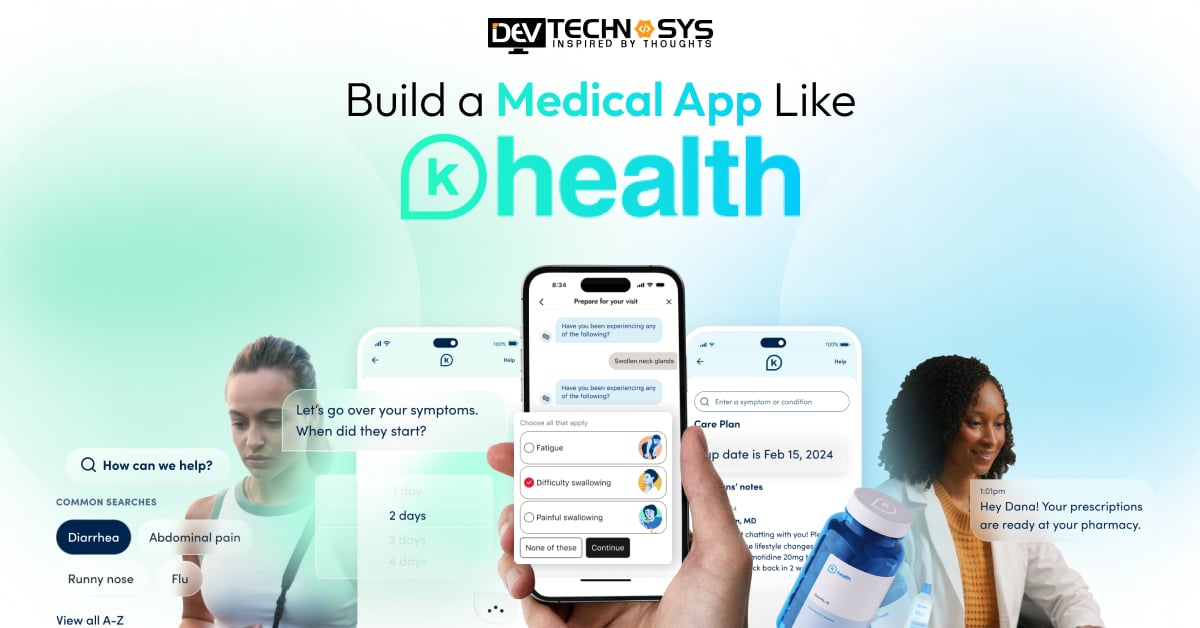Have you ever wondered how apps like K Health let you talk to a doctor without leaving your home?
In today’s fast-moving world, medication apps are changing the way we take care of our health. They help people check symptoms, get quick advice, and even chat with doctors, all from their phones!
If you’re curious about how these amazing apps are made, you’re in the right place.
Key Takeaways:
-
- In 2025, the global digital health market was valued at USD 88 billion, projected to reach USD 258.25 billion by 2029.
- K Health’s app success is powered by AI-driven symptom checking, 24/7 doctor chats, personalized health insights, and easy prescription management.
- The cost to build a medical app like K Health ranges from $8,000 to $25,000, depending on complexity, integrations, and compliance needs.
- Essential features include AI symptom checker, patient profiles, chat-based consultations, e-prescriptions, secure data storage, and HIPAA/GDPR compliance.
In this step-by-step guide, we’ll show you how to build a medical app like K Health, from idea to launch.
You don’t need to know a lot; just be eager to learn and discover! If you want to start a business or are a startup, this guide will give you all the tools and information you need to make your dream come true.
We’ll learn how to make the future of health care one app at a time!
Current and Future Market Statistics of Medical Applications
- Statista says that by 2025, the Digital Health market will have brought in US$197.88
- Revenue is anticipated to exhibit a compound annual growth rate (CAGR) of 88% from 2025 to 2029, culminating in a predicted market volume of US$258.25 billion by 2029.
- Most likely, the average income per user (ARPU) will hit $135.28.
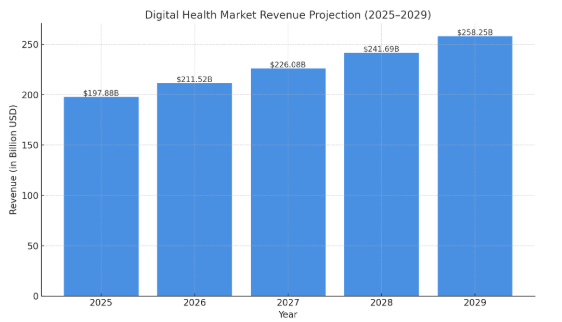
- Comparatively speaking, the United States will produce the greatest income (US$54.00 billion in 2025).
- With a total sales value of US$122.01 billion in 2025, Digital Treatment & Care will be the biggest market.
What is K Health?
K Health is a mobile health app that employs artificial intelligence to give individualized medical information and care. Users may check their symptoms, communicate with professional doctors, and get primary and urgent care at any time.
The healthcare app like Medscape and K Health provide appropriate suggestions, and the software compares user input to real-world medical problems. Affordable subscription plans provide unlimited visits, making healthcare more accessible and convenient without the need for insurance or appointments.
Success Story: K Health
- Launched in 2016, K Health aimed to democratize healthcare by using AI and data from millions of real patient records.
- Founders combined AI technology with licensed medical professionals to deliver affordable, 24/7 virtual care directly through a mobile app.
- App uses machine learning on anonymized health data, offering users symptom insights before connecting them to real doctors via chat or video.
- Achieved over 6 million users, making it one of the most downloaded health apps in the United States and globally.
- K Health has raised over $270 million in funding, with investors including Valor Equity, Kaiser Permanente, and 14W.
- Partnered with Maccabi Health Services, one of Israel’s largest HMOs, enhancing data sources and expanding internationally.
Major Types of Medical Applications
Medication reminder apps fall into key categories like telemedicine, health monitoring, and medical reference tools. These apps enhance patient care, streamline communication, support chronic disease management, and empower both patients and professionals with real-time health insights.
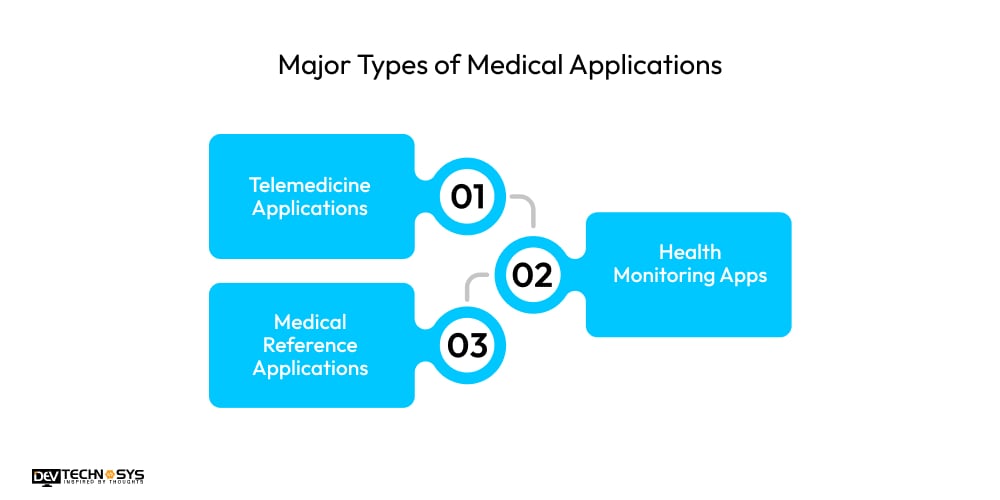
1. Telemedicine Applications
Telemedicine applications allow patients to communicate with healthcare practitioners remotely via video calls, chats, or phone. They provide consultations, diagnoses, and medications without requiring patients to attend a clinic. These applications increase access to care, shorten wait times, and are particularly effective in remote locations or during public health emergencies such as pandemics.
2. Health Monitoring Apps
Healthcare IT solutions measure vital signs, including heart rate, blood pressure, glucose levels, and physical activity. They frequently work in conjunction with wearable devices to assist in controlling chronic illnesses such as diabetes or hypertension. These applications allow for early diagnosis of health disorders and real-time data exchange with healthcare providers.
3. Medical Reference Applications
Healthcare professionals and students can use medical reference applications to access medication databases, illness libraries, clinical recommendations, and diagnostic tools. They facilitate decision-making, increase accuracy, and assure evidence-based practice. These mobile-friendly apps are vital for on-the-go learning and rapid access to critical medical information.
10 Popular Medical Apps Like K Health
Discover the best wellness and healthcare mobile apps offering instant symptom checks, virtual doctor visits, personalized care, and easy access to health resources, empowering you to manage your health anytime, anywhere.
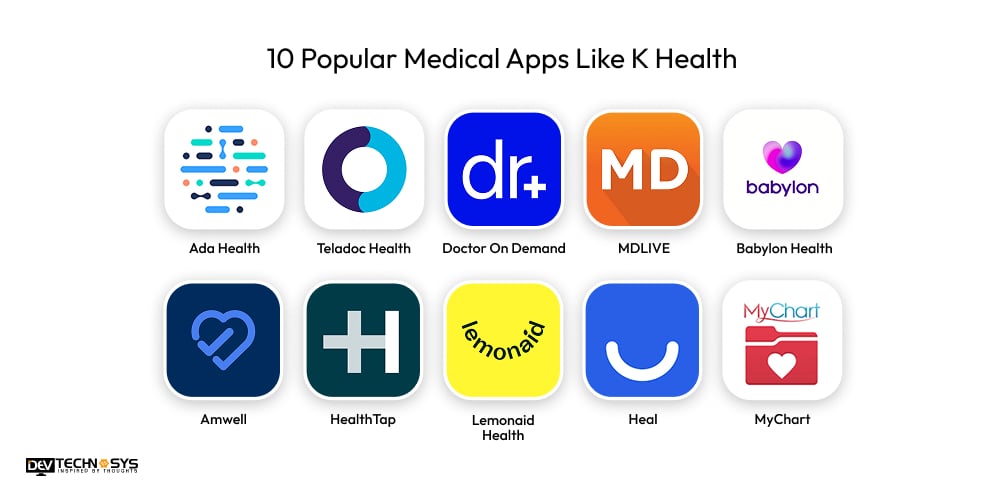
App Name |
Estimated Downloads |
Ratings (Android / iOS) |
Launched Year |
Platforms |
| Ada Health | 10M+ | 4.7 / 4.8 | 2016 | Android, iOS |
| Teladoc Health | 5M+ | 4.6 / 4.8 | 2002 | Android, iOS |
| Doctor On Demand | 1M+ | 4.7 / 4.9 | 2013 | Android, iOS |
| MDLIVE | 1M+ | 4.5 / 4.7 | 2009 | Android, iOS |
| Babylon Health | 5M+ | 4.3 / 4.7 | 2013 | Android, iOS |
| Amwell | 1M+ | 4.4 / 4.7 | 2006 | Android, iOS |
| HealthTap | 500K+ | 4.2 / 4.5 | 2010 | Android, iOS |
| Lemonaid Health | 500K+ | 4.6 / 4.8 | 2014 | Android, iOS |
| Heal | 100K+ | 4.3 / 4.6 | 2015 | Android, iOS |
| MyChart | 10M+ | 4.2 / 4.7 | 2011 | Android, iOS |
Why Businesses Want to Invest in Medical App Development?
Investing in united healthcare app development not only meets evolving consumer needs but also positions businesses at the forefront of healthcare innovation, delivering convenience, efficiency, and personalized care on a global scale.
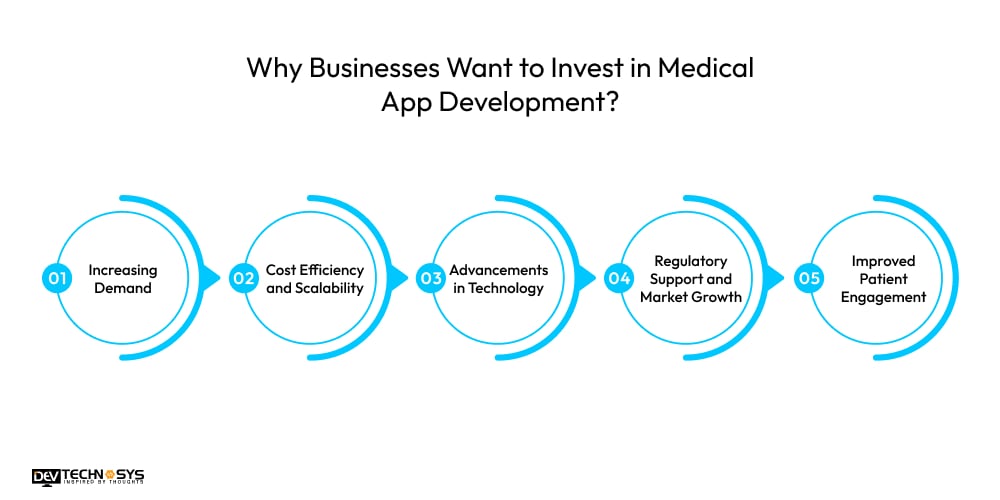
1. Increasing Demand
Consumers are increasingly looking for quick, convenient healthcare solutions that meet their hectic schedules. An app for medication reminder allows you to check your symptoms instantly, have virtual consultations, and get specialized care right from your smartphone. This ease attracts a significant number of users, making healthcare applications a profitable market for companies.
2. Cost Efficiency and Scalability
Medical applications like Healthiago help healthcare providers reduce overhead expenses by reducing in-person visits and streamlining administrative procedures. Businesses may quickly grow their services by contacting more patients remotely, cutting operational costs and improving revenue possibilities. This scalability makes app development a worthwhile investment.
3. Advancements in Technology
The advancement of AI, machine learning, and telemedicine technology has enabled medical courier apps to provide extremely accurate diagnoses and individualized treatment suggestions. Businesses that invest in cutting-edge technology can distinguish their goods, resulting in better patient outcomes and improved brand recognition in a competitive market.
4. Regulatory Support and Market Growth
Many countries are boosting digital health projects, reducing telemedicine laws, and fostering innovation. This advantageous climate, along with rising global healthcare expenditure, encourages enterprises to create applications that correspond with market trends and regulatory standards, assuring long-term success.
5. Improved Patient Engagement
Medical applications, such as HealthFlex, encourage ongoing patient participation by incorporating features like prescription reminders, health tracking, and follow-ups. They also allow for the collection of useful health data, which may be evaluated to enhance care quality and produce new products. Businesses profit from increased consumer loyalty and data-driven decisions.
Role of AI in Medical Applications
- AI quickly looks at medical data, which lets doctors make faster and more accurate decisions that lead to better patient results.
- Machine learning finds trends in patient histories and test data that help predict how a disease will get worse.
- AI-powered chatbots provide 24/7 symptom checking and basic medical advice, improving accessibility and reducing healthcare costs.
- Radiologists can find problems in X-rays, MRIs, and CT scans with great accuracy with the help of automated picture recognition.
- AI personalizes treatment plans by integrating genetic, lifestyle, and clinical data tailored to individual patient needs.
- Natural language processing takes useful information from medical records that are not organized, which speeds up the process of making professional decisions.
7 Basic Steps to Build a Medical App Like K Health
Access personalized, AI-powered healthcare anytime. Get instant symptom assessments, expert doctor consultations, and tailored treatment plans, all from your smartphone. Empower your health journey with reliable, affordable, and convenient medical advice at your fingertips, wherever you are. So, let’s explore the home health care software development process:
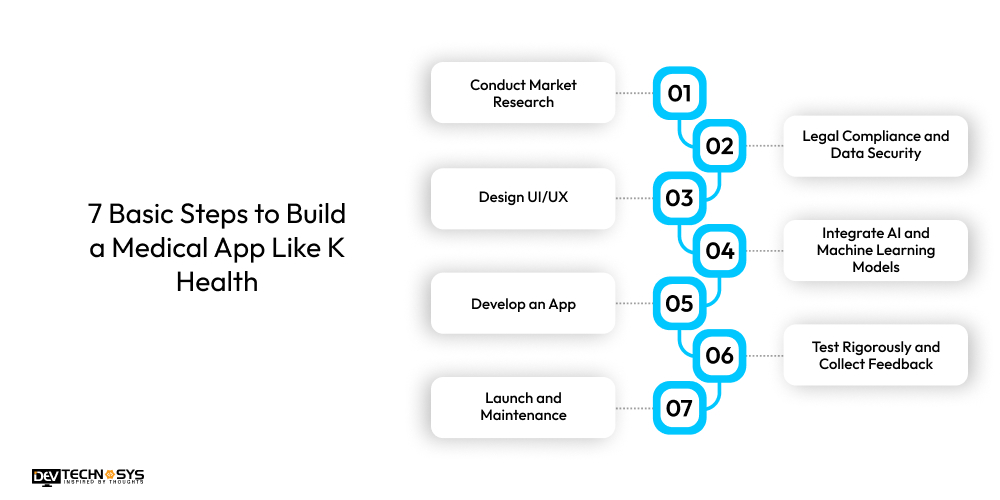
1. Conduct Market Research
Let’s begin the first stage to build an app like K Health. Start by analyzing the digital healthcare market, user pain points, and key K Health alternatives. Hire healthcare app developers to identify your target audience and define the app’s core purpose, whether it’s diagnosis, virtual care, or health tracking.
Clear goals ensure strategic alignment and help you create a product that meets real medical needs effectively.
2. Legal Compliance and Data Security
Healthcare laws like HIPAA (USA) or GDPR (Europe) must be followed by a similar app like K Health. Encryption and strict entry controls can help keep user info safe. Implement features for consent, anonymization, and privacy by design. Focusing on compliance builds user trust and protects your platform from costly legal issues and reputational damage later.
3. Design UI/UX
In the third stage to develop an app like K Health, create an intuitive, accessible user interface (UI) tailored for both patients and medical professionals. Prioritize easy navigation, clear visuals, and fast interaction.
Hire mobile app developers to design features like symptom checkers, chat windows, and health dashboards with usability testing. A well-designed UX improves engagement, retention, and overall satisfaction in medical app experiences.
4. Integrate AI and Machine Learning Models
Build AI algorithms that analyze symptoms, medical history, and user data to offer intelligent suggestions. Use large datasets to train your models. Incorporate natural language processing (NLP) for patient chat features. Robust AI integration can personalize care, improve diagnostic accuracy, and create a scalable experience like K Health’s.
5. Develop an App
Build essential features like symptom checkers, chat with doctors, appointment scheduling, prescription management, and health history. Hire dedicated developers to create a scalable backend with APIs for EHR integration, user authentication, and secure messaging. Ensure the platform supports real-time data flow for seamless interaction between users and healthcare providers.
6. Test Rigorously and Collect Feedback
Coming to the sixth step to create an app like K Health, conduct multiple testing phases, including unit, integration, usability, and security testing. Involve real users and healthcare professionals in beta testing. Collect feedback to identify bugs, UX issues, or missing features. Continuous improvement based on real-world input ensures a polished, reliable, and safe medical app before full deployment.
7. Launch and Maintenance
Let’s move to the last stage of the medical mobile app development process: release your app on iOS and Android platforms. Monitor key performance metrics like user engagement, retention, and satisfaction.
Provide regular updates and introduce new features based on feedback. Use cloud services for scalability and integrate analytics to guide your growth strategy and optimize long-term success in the healthcare space.
Why Do Patients Select K Health Over Other Medical Apps?
Experience personalized, AI-driven healthcare with instant symptom checks, affordable doctor consultations, and continuous health monitoring, empowering you to take control of your well-being anytime, anywhere, all from your smartphone.
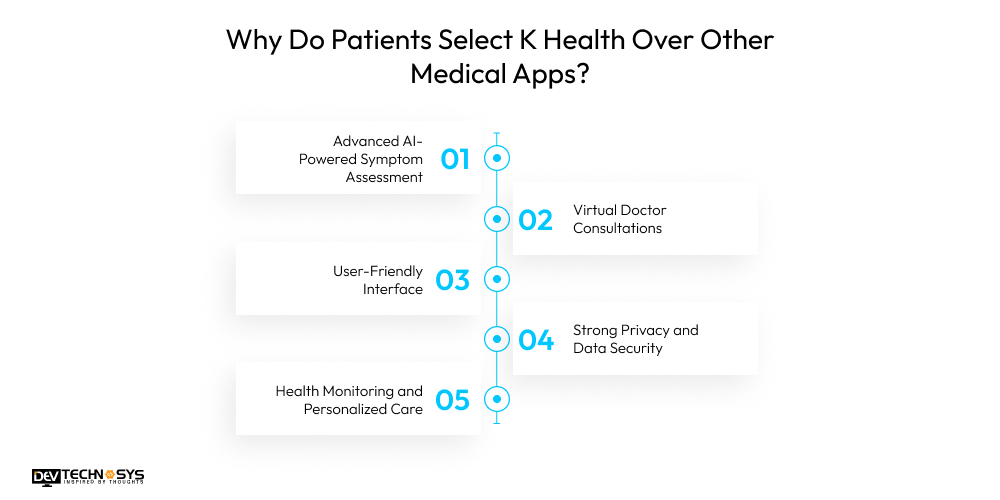
1. Advanced AI-Powered Symptom Assessment
K Health uses AI and millions of genuine medical information to give individualized, accurate symptom analysis. This technology allows people to immediately grasp probable reasons without guessing, providing a dependable alternative to generic symptom checklists or long wait periods for medical visits.
2. Virtual Doctor Consultations
K Health provides on-demand access to board-certified doctors for a fraction of standard healthcare prices. This low cost and convenience make it an appealing choice for people looking for quality medical advice without the price or trouble of in-person visits.
3. User-Friendly Interface
K Health’s simple software is designed for ease of use, allowing users to effortlessly enter symptoms, obtain fast insights, and follow treatment regimens. This simplicity appeals to patients of all ages, making healthcare more accessible by eliminating confusing medical language and complex processes.
4. Strong Privacy and Data Security
Patients trust K Health’s dedication to safeguarding sensitive health information. Transparent privacy policies and strong security measures guarantee that personal medical data is treated with care, which fosters trust and peace of mind in digital healthcare.
5. Health Monitoring and Personalized Care
Beyond diagnosis, K Health offers continuous health monitoring and personalized care programs. This enables patients to manage their health proactively, keep informed about their progress, and achieve long-term wellbeing rather than only during isolated medical appointments.
10 Basic and Advanced Features of Medical Apps Like K Health
These features create a seamless, efficient, and reliable healthcare experience, making apps like K Health invaluable tools for modern medical care and patient empowerment.
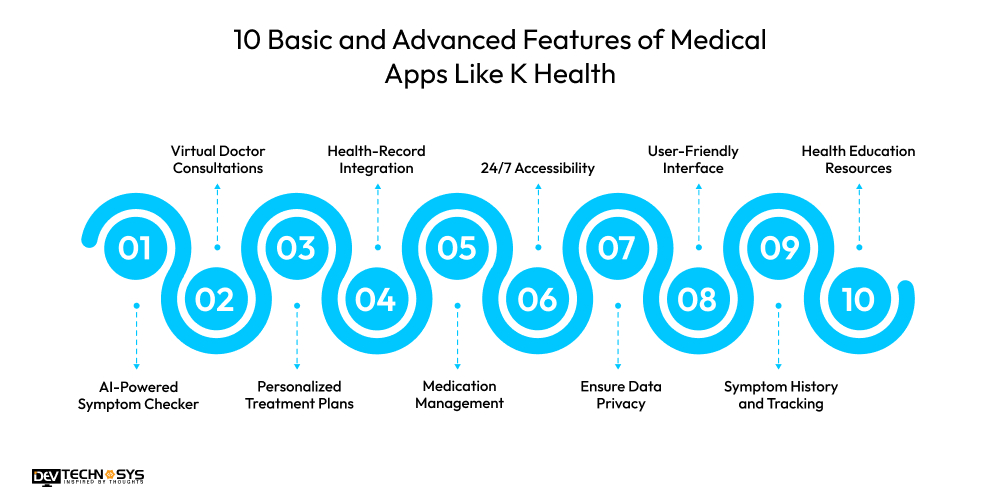
1. AI-Powered Symptom Checker
K Health clone apps use AI and vast medical databases to give accurate, tailored symptom evaluations instantaneously.
2. Virtual Doctor Consultations
A similar app like K Health provides on-demand video or chat appointments with board-certified physicians, allowing consumers to get expert guidance without visiting clinics.
3. Personalized Treatment Plans
K Health alternatives provide personalized treatment recommendations tailored to individual symptoms, medical history, and test results, promoting effective health management.
4. Health-Record Integration
An app like HealthTap enables users to upload or sync their medical information and histories, providing a more comprehensive picture.
5. Medication Management
K Health alternatives offers reminders and tracking capabilities to assist patients in adhering to recommended medications.
6. 24/7 Accessibility
Provides 24/7 access to health information and consultations, supporting users’ different schedules and urgent requirements.
7. Ensure Data Privacy
The K Health clone apps implement stringent security processes to secure sensitive health information and ensure compliance with legislation such as HIPAA.
8. User-Friendly Interface
Designed for simplicity, allowing users of all ages and technical ability levels to navigate with ease.
9. Symptom History and Tracking
The K Health alternatives record previous symptoms and health data to track improvement and aid in correct diagnosis during follow-up visits.
10. Health Education Resources
K Health clone apps provide articles, videos, and FAQs to help people learn about illnesses, treatments, and health advice.
The Cost to Build a Medical App Like K Health
The cost to develop a medical app like K Health ranges from $8,000 to $25,000, depending on the complexity, features, and location of the development team. Key cost drivers include AI integration for symptom checking, secure telemedicine capabilities, user-friendly design, and compliance with healthcare regulations (like HIPAA).
Ongoing expenses include maintenance, updates, and server infrastructure. Investing in a doctor on-demand app development company ensures a reliable, scalable app that delivers accurate medical advice and a seamless user experience.
Feature/Phase |
Estimated Cost (USD) |
Description |
| Requirement Analysis & Design | $5,000 – $8,000 | Planning, UI/UX design, prototyping |
| AI Symptom Checker | $6,000 – $10,000 | Development and integration of AI algorithms |
| Telemedicine Module | $7,000 – $9,000 | Video/Chat consultations with doctors |
| User Authentication & Security | $4,000 – $7,000 | HIPAA compliance, data encryption, and login systems |
| Backend Development | $10,000 – $14,000 | Server, database, APIs |
| Mobile App Development | $8,000 – $22,000 | iOS and Android app development |
| Testing & Quality Assurance | $3,000 – $5,000 | Bug fixes, performance optimization |
| Maintenance & Updates (Annual) | $2,000 – $4,000 | Ongoing support and feature enhancements |
Total Estimated Cost: $8,000 – $25,000+
What Factors Affect the Medical App Development Cost?
Healthcare app development costs vary based on features, AI integration, platform choice, regulatory compliance, design complexity, development team location, security requirements, and ongoing maintenance, each influencing the investment needed to build a reliable, user-friendly healthcare solution.
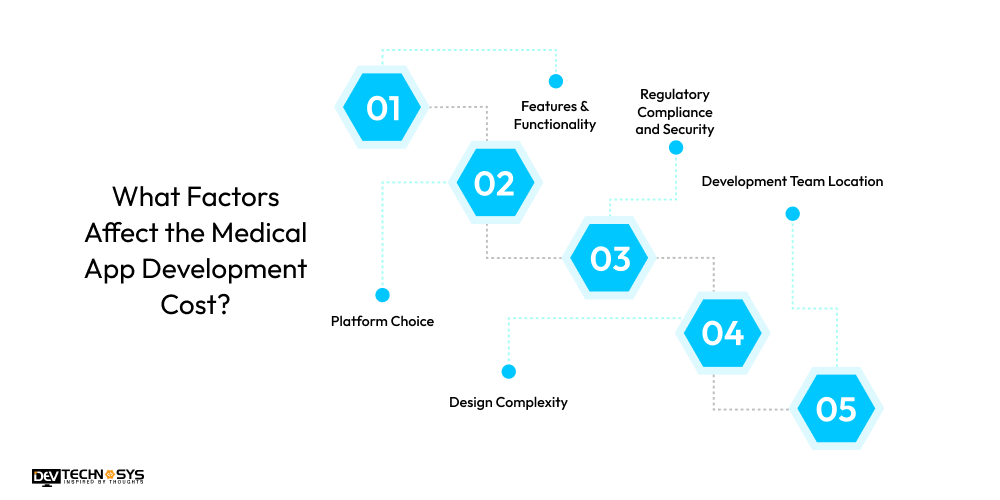
1. Features & Functionality
The complexity and amount of features, such as AI symptom checks, video consultations, and health tracking, have a substantial influence on prices. More complex capabilities necessitate more development time and specialized skills, raising the overall medical app development cost required to provide a reliable, user-friendly medical app.
Feature |
Estimated Cost (USD) |
| AI Symptom Checker | $5,000 – $8,000 |
| Video/Chat Consultation | $4,000 – $7,000 |
| Health Tracker/Monitoring | $3,000 – $6,000 |
| Medication Reminders | $4,000 – $8,000 |
| Appointment Scheduling | $2,500 – $4,000 |
2. Platform Choice
The K Health app development cost increases when it is developed for many platforms (iOS, Android, and Web). Native apps require distinct code for each platform, whereas cross-platform development might save money but may compromise performance and user experience, impacting the overall mobile app development cost.
Platform |
Estimated Cost (USD) |
| iOS App (Native) | $12,000 – $22,000 |
| Android App (Native) | $8,000 – $15,000 |
| Cross-Platform (Flutter/React Native) | $15,000 – $24,000 |
3. Regulatory Compliance and Security
To secure sensitive data, healthcare applications must follow tight rules such as HIPAA and GDPR. Implementing strong security measures, encryption, and compliance checks increases K Health app development cost, but is required for legal and user trust reasons.
Compliance/Security Task |
Estimated Cost (USD) |
| HIPAA/GDPR Compliance | $4,000 – $7,000 |
| End-to-End Encryption | $2,000 – $4,000 |
| Secure Login & Authentication | $5,000 – $8,000 |
| Data Storage and Backup Protocols | $3,000 – $5,000 |
4. Design Complexity
The ALLEVIA healthcare app development cost is influenced by the caliber of the user interface and experience design. Simple, intuitive designs cost less, but highly personalized, interactive, or accessible designs take more resources, including professional designers and thorough testing to assure usability and engagement.
Design Type |
Estimated Cost (USD) |
| Basic UI/UX Design | $5,000 – $10,000 |
| Custom UI/UX Design | $10,000 – $15,000 |
| Accessibility & Responsive Design | $5,000 – $8,000 |
5. Development Team Location
Hiring talented developers from various places affects pricing. As a general rule, developers in Asia and Eastern Europe charge less than those in North America and Europe. Furthermore, skilled healthcare app developers may expect higher costs owing to their particular understanding.
Region |
Hourly Rate (USD) |
Average Project Cost |
| North America | $50 – $80 | $40,000 – $75,000 |
| Western Europe | $40 – $70 | $35,000 – $68,000 |
| Eastern Europe | $30 – $60 | $30,000 – $58,000 |
| South Asia (e.g., India) | $15 – $25 | $8,000 – $25,000 |
Tech Stacks to Build a Medical App Like K Health
Layer |
Technology/Tools |
Purpose |
| Frontend (Mobile) | React Native, Flutter, Swift (iOS), Kotlin (Android) | Cross-platform or native mobile app development |
| Backend | Node.js, Django (Python), Ruby on Rails | Handles API logic, business rules, and server-side ops |
| Database | PostgreSQL, MongoDB, Firebase Realtime DB | Stores user data, health records, chat history |
| AI/ML | Python (TensorFlow, PyTorch), OpenAI API | Symptom checker, diagnostics, recommendation engines |
| Authentication | OAuth 2.0, Firebase Auth, Auth0 | Secure user login and identity management |
| Cloud Hosting | AWS, Google Cloud, Microsoft Azure | Scalable cloud infrastructure for hosting backend |
| APIs & Integrations | Twilio (chat/video), HealthKit, Google Fit | Video calls, fitness data, external device integration |
| Compliance & Security | AWS Shield, Cloudflare, JWT, SSL, HIPAA modules | Ensure HIPAA/GDPR compliance and secure data exchange |
| Analytics & Monitoring | Firebase Analytics, Mixpanel, Sentry | Track user behavior, performance, and crash analytics |
| DevOps | Docker, Kubernetes, Jenkins, GitHub Actions | CI/CD, containerization, and deployment automation |
How to Make Money From Medical Apps Like K Health?
Monetize best medical apps like K Health through subscriptions, pay-per-consultation, in-app purchases, healthcare partnerships, and ethical data insights, creating sustainable revenue while delivering accessible, tech-driven healthcare services to users.
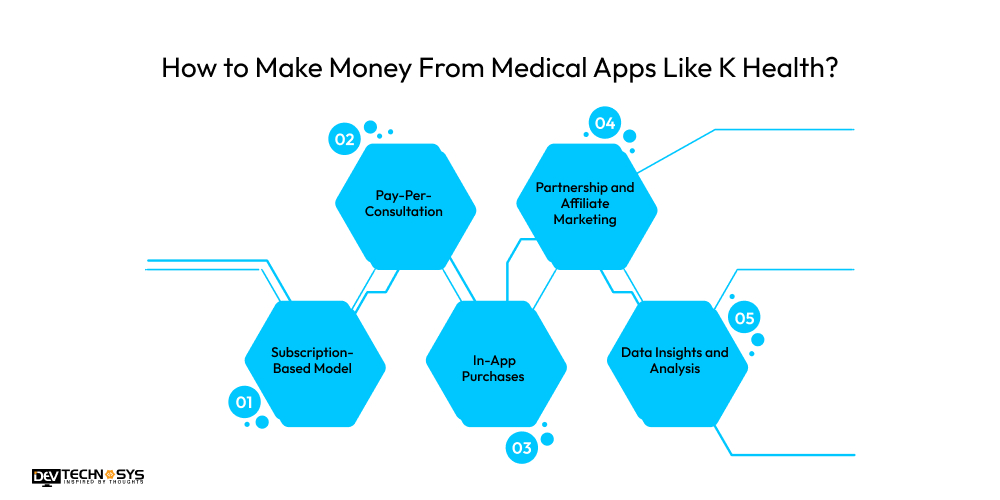
1. Subscription-Based Model
One of the most prevalent income methods is to charge consumers a monthly or annual membership fee. This may include access to premium services like unlimited medical consultations, AI-powered health evaluations, or tailored treatment programs. By continually offering value, you may generate a stable source of recurring cash while increasing customer retention.
2. Pay-Per-Consultation
Many medical delivery apps earn income by charging users for individual consultations. Patients may pay for virtual appointments with licensed doctors or experts using the app. This strategy caters to customers who want flexible, one-time payments rather than committing to a subscription, and it is suitable for on-demand healthcare services.
3. In-App Purchases
If businesses create a mobile app like K Health, it may provide extra services or content for purchase, such as mental health programs, workout regimens, dietary guidance, or prescription delivery. These additions not only bring additional value to the user, but they also open up new income streams without interfering with the primary app experience.
4. Partnership and Affiliate Marketing
Partnerships with pharmacies, diagnostic laboratories, insurance companies, and wellness brands may all generate revenue. When customers purchase medicine or schedule lab tests using your app, you might earn a commission. Furthermore, suggesting healthcare items or services might result in cash via affiliate links.
5. Data Insights and Analysis
With user consent and strong privacy compliance (e.g., HIPAA, GDPR), anonymised health data can be examined for insights and sold to research organizations, healthcare providers, and pharmaceutical businesses. According to the mobile app development company, this has the potential to be a significant revenue generator while also enhancing public health.
Conclusion
To make a medical software like K Health, you need the perfect mix of AI technology, a safe infrastructure, an easy-to-use design, and compliance with the law. Every product, from symptom checks to virtual consultations, must put user experience and confidence first.
When you work with an experienced healthcare app development company, you can be confident that you will get professional advice, a scalable architecture, and solutions that meet your needs and are HIPAA-compliant. Now is the best moment to put money into new ideas that make healthcare easier to access, cheaper, and more effective, as there is a rising need for digital health.
Frequently Asked Questions
Q1. How Much Does It Cost To Build a Medical App Like K Health?
The cost to develop a medical app like K Health is around $8,000 and $25,000, depending on features, platform choice, AI integration, design complexity, and compliance requirements such as HIPAA or GDPR.
Q2. How Long Does it Take to Create a Medical App Like K Health?
It usually takes 3 to 6 months to create a medical app like K Health, depending on the features, design, testing, AI integration, complexity, and regulatory compliance needs like GDPR or HIPAA.
Q3. What Technologies Are Used to Make a Medical App Like K Health?
Technology from many different areas is used to make a medical app like K Health. Let’s explore:
- Ruby
- Python
- Java
- Kotlin
- PHP
- C++
Q4. Can I Use Open-Source Healthcare APIs?
Yes, you can use open-source healthcare APIs to speed up development, but ensure they are secure, reliable, and compliant with regulations like HIPAA or GDPR before integration.
Q5. What Are the Challenges Faced When Build a Medical App Like K Health?
- Regulatory Compliance
- Data Privacy
- Security Implementation
- AI Accuracy
- Clinical Validation
- Cross-Platform Compatibility
